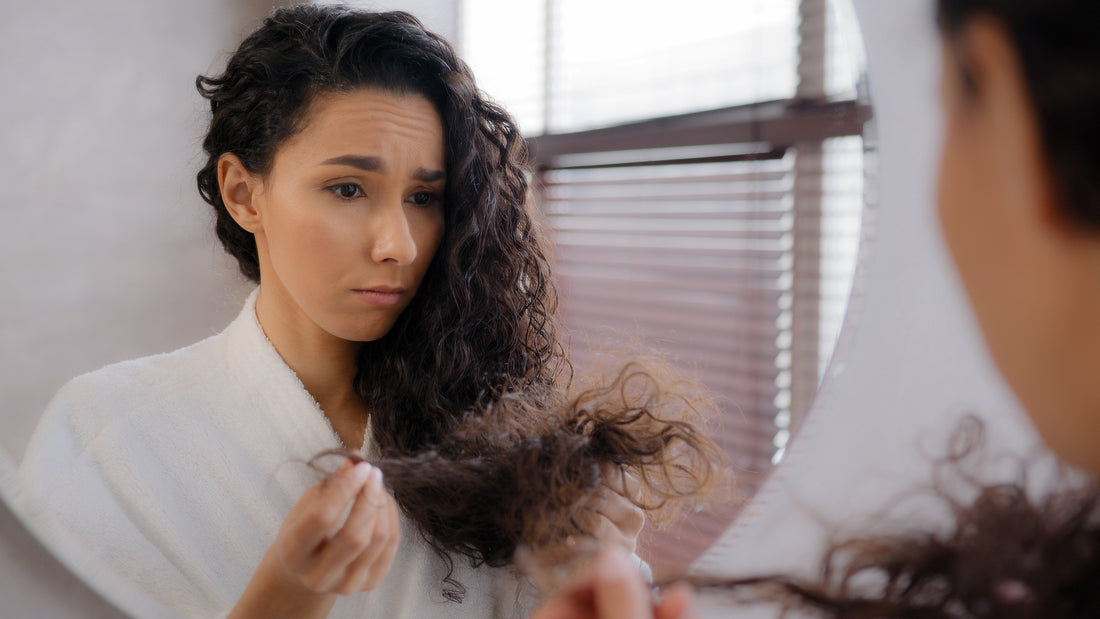
Hair, skin and nail issues that could signal a vitamin or mineral deficiency
‘You are what you eat,’ is a phrase we hear time and time again, but research has shown that we are also what we don’t eat, with vitamin and mineral deficiencies found to have some very visual affects when it comes to our hair, skin and nails. ‘Signs of a vitamin deficiency can include fatigue, frequent illness, slow healing, and changes in your skin or hair,’ explains Laura Dowling, a qualified Pharmacist, founder of fabU Wellness supplements and a member of The Skin Nerd Health & Wellness Panel. ‘It's essential to keep an eye out for these symptoms because vitamins play a crucial role in our overall health. But don't worry—if you're lacking in a particular vitamin, there are plenty of ways to get more of it through food or supplements.’
Hair loss
‘If you notice your hair shedding more than usual, it may be worth getting your iron and vitamin D levels checked,’ suggests Galway-based Trichologist Deborah Whelan. ‘Vitamin D deficiency has been associated with two of the most common forms of hair loss with research revealing that 91% of patients with alopecia areata had a Vitamin D deficiency, compared to only 33% of those without.’ If you have noticed your hair suddenly becoming brittle, thinning or shedding suddenly, visit your GP, who may refer you for tests. ‘If blood tests do reveal a deficiency, supplements can be helpful in getting your levels back up. Eat a balanced diet including enough protein (0.8 grams/kilogram/day), recommends Deborah. ‘Hair is made up of primarily protein (keratin), so adequate protein is vital to maintain and grow hair.’
Sources of vitamin D: Mushrooms, cheese, beef, pork, liver and egg.
Bruising easily
Vitamin C is essential for many bodily functions but also key for the development of blood vessels, assisting in the regulation and synthesis of collagen. Subsequently, a shortage of this vitamin can lead to a weakening of the blood capillaries, making it easier for your skin to come up in bruises when you have slight knocks.
Sources of vitamin C: Berries, tomatoes, cantaloupe, citrus fruits, leafy greens and sweet potatoes.
Unexpected grey hairs
The average age to begin noticing grey hairs is 35 years old but if you are seeing more silver strands and a lot younger than this, it could be that you are lacking nutritionally. Research has linked prematurely greying hair with a shortage of B12. It can also signal low levels of folate and biotin.
Sources of vitamin B12: Dairy products, poultry, eggs, fortified bread / cereals, meat and seafood.
Keratosis Pilaris
Rough patches or small bumps on your arms can be indicative of a shortage of vitamin A or zinc. The official name for these little bumps is Keratosis Pilaris, which is a common but harmless skin condition that can cause frustration and irritation. Studies have suggested that this condition may have a link with a lack of vitamin A, an important nutrient that improves the appearance and texture of skin. It helps smooth rough bumps and also reduce the production of excess keratin that leads to keratosis pilaris.
Sources of Vitamin A: Sweet potatoes, pumpkin, carrots, dairy products, fortified bread / cereals, leafy green vegetables and eggs.
Brittle nails
Nails are commonly cited as an indicator of health and ‘brittle or spooning of the nails’ is a common symptom of iron-deficiency anemia. Other symptoms include splitting, breaking and peeling nails.*
Sources of iron: Beans, fortified grains, lean meat, nuts, seafood.
Dry / itchy scalp
Lack of omega-3 fatty acids has been suggested as a contributing factor in the development of a dry, itchy scalp, and so keeping your levels topped up can be a good way to replenish and comfort your scalp.
Sources of Omega-3: Oily fish, walnuts, hemp seed, chia seeds and brussels sprouts.
Nerdie note: ‘If you're considering investing in supplements, it's essential to prioritise safety and quality,’ advises pharmacist Laura Dowling. ‘Look for supplements that have clinical backing behind their claims and make sure you understand the active ingredient and the proper dose. Be wary of any products that make outrageous claims or aren't transparent about their ingredients, but most importantly, always consult with a healthcare professional before starting any new supplement regimen. They can help you determine what you need and what's safe for you to take.’
Sources
*National Heart, Lung, and Blood Institute and the U.S. Department of Health and Human Services.
** Aşkın Ö, Uzunçakmak TKÜ, Altunkalem N, Tüzün Y. Vitamin deficiencies/hypervitaminosis and the skin. Clin Dermatol. 2021 Sep-Oct;39(5):847-857.
